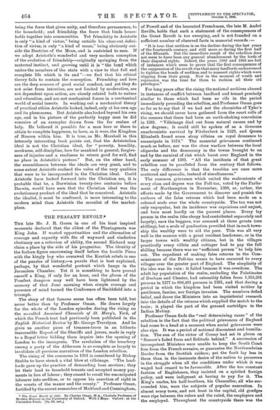BOOKS.
ARISTOTLE'S THEORY OF CONDUCT.*
THERE is a mot told of the late Duke of Marlborough which may or may not be true, but which certainly conveys a truth.
He is reported to have said that after visiting the Royal Academy he was in the habit of washing out his eyes at the National Gallery. In the same way, it is sufficiently refreshing and recreative to turn from modern ethical writers to
Aristotle. The moderns are all atmosphere ; their perspective, their sense of proportion, their sense of fitness or humour,
seem all blurred. We are in the atmosphere and cannot justly appreciate the scene. It is the reverse with Aristotle. We are outside his world ; we have very little touch with the realm of thought within which he moved ; we are not fogged with his atmosphere ; and so we can admire his lucidity, his perspective, his proportion, his sense of limitation, and his ability to exhibit everything that he desires to exhibit. Our ethics are probably much nearer absolute truth than his, but he is much nearer truth as he conceived it than we are to truth as we conceive it, Our accumulated knowledge and records of experience are so vast that we know not how to present them to a hungry world. His feast of reason is all on
the table at once, an admirable meal that appears to exhaust the digestive intellectual delicacies of the universe. It is good to go back to Aristotle, if for nothing else, for method, and we owe a very real debt of gratitude to Mr. Thomas Marshall for leading us back to the Nicomachaea,n Ethics in so refreshing and recreative a way.
The Ethics is not a familiar part of the average educated
man's mental outfit. If he studies the work at all—at Oxford or elsewhere—be studies it as a task. Mr. Marshall, however, realises the value of the work as a practical guide to life, and has given it to modern readers in such a form that it will not be readily put aside if once taken up, despite the inherent difficulties of the text :—,
" An attempt is made in this book to surmount these diffi- culties, (a) by a general introduction in which the purport of the Ethics is summarily set forth; (b) by special introductions to the several chapters, with explanatory remarks at the end of each chapter ; (c) by a paraphrase of the text—some- times full, sometimes condensed, in which repeated passages are left out and some liberties are taken in way of omission and transposition; (d) by the use of modern examples for the sake of bringing Aristotle's meaning home to present day readers. Those who may be inclined to resent the use of homely and familiar illustrations to a great classic, may be reminded that Aristotle himself is fond of borrowing from the common events of everyday life, from the gossip of society and the market as well as from his own extensive reading, to illustrate his meaning."
Mr. Marshall goes on to tell us that though he is editing Aristotle, be feels under no duty to reconcile his philosophy with that of Plato or of Kant :- "There are, and always have been, writers ready to undertake this task—with what success impartial readers, if any can be found, must judge. Plato's idea of ,the good' reappears in ants Ethics as the idea of Beason formally determining the conception of Duty, and hence it is not surprising that the modern advocates of a Platonised Ethics are usually adherents of Kant. The present writer suggests that neither the Kantian conception of Duty nor the Platonic one of an absolute standard in morals can be reconciled with Aristotle's language, or made to lit in with the political aims which dominate the Ethics."
There is possibly reason for disagreement with Mr. Marshall on this fundamental question, though certainly QUO ought not to attempt to construct a common ground for those thinkers simply because it seems intolerable for the greatest thinkers to think differently on the greatest subjects. It will be convenient to consider in outline Aristotle's position, and then see whether it is really irreconcilable with that of Plato or Kant. At first sight they SOOM quite irreconcilable, for, formally rejecting the Platonic patterns, Aristotle created an apparently vari- able standard of conduct by making social praise or blame • Aristotle's Theory of Conduct. By Thomas Marshall, N.A. London: T. Mahar trawin. [51a. aata
the test of good or bad conduct. But it does not necessarily follow from such a test that the standard of conduct is a variable standard. If any man could attain to what Aristotle terms "complete happiness" he would become the absolute standard of conduct, provided that his life proved to be a reconciliation of the practical and the theoretic life. Like the Hegelian, Aristotle regarded matter as a necessary evil, and thought that "happiness for man" could only be secured by "the exercise of practical intelligence on things immersed in matter." If, however, a being could be found who could so far abolish the evil characteristics of matter as to carry into daily life the perfect happiness arising from "the application of pure reason to the data of necessary truth," then the dualism between the theoretic and the practical life would be abolished. Christianity deliberately claims that our Lord, in fact, achieved this result, and that the following of Christ can put every man in the way of approaching such a result. The positions of Plato and Kant are thus not irreconcilable with that of Aristotle, though Aristotle himself would perhaps have been the last to admit the fact.
It is the practical life, the Doctrine of the Mean, that
Aristotle is concerned with in his Ethics. If Hegelian philosophy has nothing to do with dollars, the Aristotelian
theory of conduct has a great deal to do with them. It is the man in the market that he desires to reach by his golden Rule of the Mean. "Of two evils choose the least. One extreme is almost always worse than another." "Consider in what direction you are most easily led. Men are not all made to a pattern." "Above all, be on your guard against pleasure."
It is habit that makes us good. Few are born good, and still fewer can be taught to be good. Continual repetition of right actions forms the road of high morals. This is rather a gross utilitarianism, but it is certainly a good working rule, which represents very closely what happens in life. Morals in trade, for instance, are dictated by the customs of the particular trade, and it is a fact that men of the highest integrity in private life will, because it is the habit of their business, do things that are totally inexcusable. If, on the other hand, a high standard dictates the custom, it becomes absolutely binding. Repetition by a number of men of a particular course of action makes that course one that can- not easily be deviated from, Habit is everything in conduct, and Mr. Marshall aptly quotes the lines :—
"Refrain to-night,
And that shall lend a kind of easiness To the next abstinence : the next more easy : For use almost can change the stamp of Nature."
But in many ways the Rule of the Mean deserves the con- temptuous criticism that Plato pours upon it. It is, he says,
merely the rule of conduct employed by social insects, such as bees, wasps, and ants. It is a fair criticism, for man is some-
thing more than, is ultimately something quite other than, a social amm.al. Mr. Marshall says :— "Those who deny any conduct to be good which is not deter- mined by the supreme authority of conscience, or which is not under the control of a completely fashioned will, or which is not due to a change of nature, or which does not follow as the result of conversion or of a new heart, may object to the doctrine of the mean, but their objection is only another way of saying that they think their ethics to be better than Aristotle's, which may or may not be true. When it has been settled which among these com- peting theories is the correct one, it will be time enough to apologise for saying that the difference between virtue and vice is quantitative."
The matter cannot, however, be dismissed quite so summarily.
If man, in addition to being a social animal, is a being who desires to establish belief in "Immortality, Freedom, and
God," he must assume the existence of a moral law indepen- dent of society with which it is possible for him perfectly to harmonise, and through which he can attain even to that "complete happiness" with which Aristotle had to round off his philosophy of life. The ethics of the Lykaeum are merely the ethics of the market-place,'--working rules for making good citizens out of the very mixed material of a utilitarian world.
The weakness t:if the Doctrine of the Mean—if it is treated as anything else than a mere rule of political and commercial life—appears most strikingly in its application to the human relationships described by the words " Friendship " and "Love." No one has realised more fully than Aristotle the social value of friendship as tending to good conduct. Modern society may be said to be built on friendship and love,—love being the force that gives unity, and therefore permanence, to the household ; and friendship the force that binds house- holds together into communities. Yet friendship to Aristotle is only "a kind of virtue," being outside his clear-cut defini- tion of virtue, is only "a kind of mean," being obviously out- side the Doctrine of the Mean, and is restricted to men. If we adopt Aristotle's wonderful and very modern conception of the evolution of friendship—originally springing from the maternal instinct, and growing until it is "the bond which unites the members of the state with a view to that full and complete life which is its end "—we find that his ethical theory fails to contain the conception. Friendship and love are the deep sources of good social conduct, and yet they do not arise from intention, are not limited by moderation, are not dependent upon action, are closely related both to nature and education, and are not mechanical forces in a mechanical world of social insects. In working out a mechanical theory of practical ethics Aristotle looked, indeed, only at his own age and its phenomena. But Aristotle also looked beyond his own age, and in his picture of the perfectly happy man be did conceive of an exemplar drawn from the far realms of help. He believed it possible for a man here or there to attain to complete happiness, to have, as it were, the Kingdom of Heaven within him. It is true, as Mr. Marshall in this intensely interesting book points out, that the Aristotelian ideal is not the Christian ideal, for "poverty, humility, meekness, self-discipline, love for mankind in general, forgive- ness of injuries and a readiness to return good for evil, find no place in Aristotle's picture." But, on the other hand, the resemblances between the ideals are very great, and to some extent Aristotle realised the value of the very qualities that were to be incorporated in the Christian ideal. Could Aristotle have looked forward into the Christian era, it is probable that he, a Darwinian twenty-two centuries before Darwin, would have seen that the Christian ideal was the evolutionary product of the ideal that he conceived. Aristotle the idealist, it must be confessed, is more interesting to the modern mind than Aristotle the moralist of the market- place.































































 Previous page
Previous page